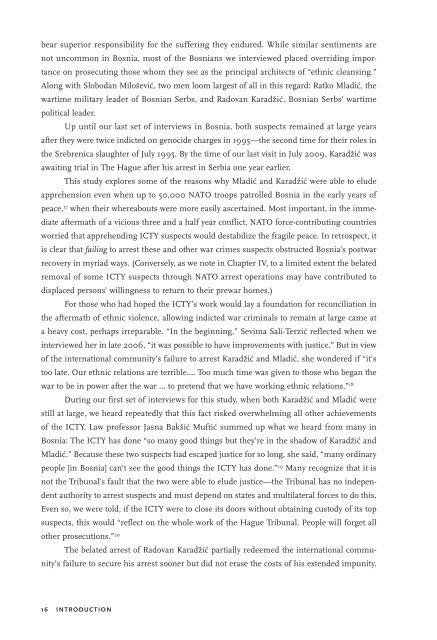That Someone Guilty Be Punished - Open Society Foundations
That Someone Guilty Be Punished - Open Society Foundations
That Someone Guilty Be Punished - Open Society Foundations
You also want an ePaper? Increase the reach of your titles
YUMPU automatically turns print PDFs into web optimized ePapers that Google loves.
ear superior responsibility for the suffering they endured. While similar sentiments are<br />
not uncommon in Bosnia, most of the Bosnians we interviewed placed overriding importance<br />
on prosecuting those whom they see as the principal architects of “ethnic cleansing.”<br />
Along with Slobodan Milošević, two men loom largest of all in this regard: Ratko Mladić, the<br />
wartime military leader of Bosnian Serbs, and Radovan Karadžić, Bosnian Serbs’ wartime<br />
political leader.<br />
Up until our last set of interviews in Bosnia, both suspects remained at large years<br />
after they were twice indicted on genocide charges in 1995—the second time for their roles in<br />
the Srebrenica slaughter of July 1995. By the time of our last visit in July 2009, Karadžić was<br />
awaiting trial in The Hague after his arrest in Serbia one year earlier.<br />
This study explores some of the reasons why Mladić and Karadžić were able to elude<br />
apprehension even when up to 50,000 NATO troops patrolled Bosnia in the early years of<br />
peace, 17 when their whereabouts were more easily ascertained. Most important, in the immediate<br />
aftermath of a vicious three and a half year conflict, NATO force-contributing countries<br />
worried that apprehending ICTY suspects would destabilize the fragile peace. In retrospect, it<br />
is clear that failing to arrest these and other war crimes suspects obstructed Bosnia’s postwar<br />
recovery in myriad ways. (Conversely, as we note in Chapter IV, to a limited extent the belated<br />
removal of some ICTY suspects through NATO arrest operations may have contributed to<br />
displaced persons’ willingness to return to their prewar homes.)<br />
For those who had hoped the ICTY’s work would lay a foundation for reconciliation in<br />
the aftermath of ethnic violence, allowing indicted war criminals to remain at large came at<br />
a heavy cost, perhaps irreparable. “In the beginning,” Sevima Sali-Terzić reflected when we<br />
interviewed her in late 2006, “it was possible to have improvements with justice.” But in view<br />
of the international community’s failure to arrest Karadžić and Mladić, she wondered if “it’s<br />
too late. Our ethnic relations are terrible…. Too much time was given to those who began the<br />
war to be in power after the war … to pretend that we have working ethnic relations.” 18<br />
During our first set of interviews for this study, when both Karadžić and Mladić were<br />
still at large, we heard repeatedly that this fact risked overwhelming all other achievements<br />
of the ICTY. Law professor Jasna Bakšić Muftić summed up what we heard from many in<br />
Bosnia: The ICTY has done “so many good things but they’re in the shadow of Karadžić and<br />
Mladić.” <strong>Be</strong>cause these two suspects had escaped justice for so long, she said, “many ordinary<br />
people [in Bosnia] can’t see the good things the ICTY has done.” 19 Many recognize that it is<br />
not the Tribunal’s fault that the two were able to elude justice—the Tribunal has no independent<br />
authority to arrest suspects and must depend on states and multilateral forces to do this.<br />
Even so, we were told, if the ICTY were to close its doors without obtaining custody of its top<br />
suspects, this would “reflect on the whole work of the Hague Tribunal. People will forget all<br />
other prosecutions.” 20<br />
The belated arrest of Radovan Karadžić partially redeemed the international community’s<br />
failure to secure his arrest sooner but did not erase the costs of his extended impunity.<br />
16 INTRODUCTION

















